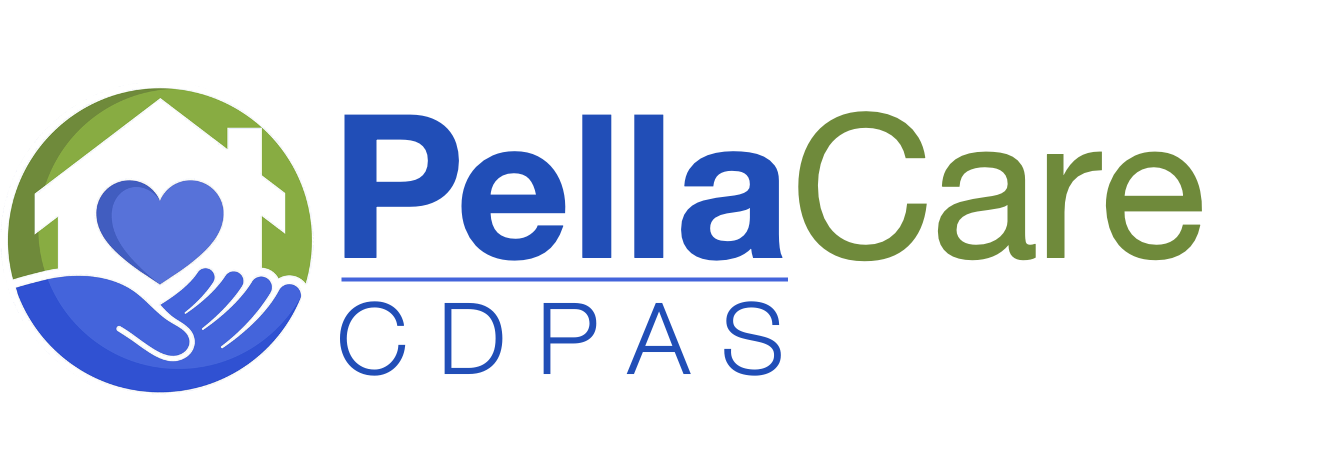Introduction
Caregiving is a deeply rewarding profession, but it can also be demanding and lead to burnout if not managed properly. Understanding how to prevent caregiver stress is crucial for maintaining a healthy and effective caregiving environment.

Taking time for self-care is essential for preventing caregiver stress.
At Pella Care CDPAS, we recognize the challenges caregivers face and offer support through our Consumer Directed Personal Assistant Program (CDPAP). This program is created to empower caregivers and clients by creating a supportive and nurturing environment. By focusing on self-care and stress prevention, caregivers can maintain their well-being and continue providing high-quality care.
Understanding Caregiver Burnout
Caregiver burnout is a state of mental, emotional, and physical exhaustion caused by the demands of caregiving. When burnout occurs, caregivers may feel disengaged, overwhelmed, and consistently stressed. Unlike many professions, caregivers bear the heavy responsibility of caring for someone who cannot care for themselves, making burnout a more pressing issue.Key Risk Factors for Caregiver Stress
Certain factors can increase the risk of caregiver stress and burnout. Recognizing these factors is the first step in preventing stress:- Caring for a Family Member: Providing care for a loved one adds an emotional layer to the already demanding role of a caregiver. The close bond and personal connection can make it difficult to separate caregiving from personal life, leading to constant emotional strain.
- Long Working Hours: Extended hours in any job can lead to burnout, but in caregiving, the physical and emotional demands intensify the risk. Caregivers often work long shifts without breaks, making it challenging to maintain their well-being.
- Lack of Skills for Managing Difficult Situations: Not all caregivers are equipped with the necessary skills to handle challenging situations, especially when dealing with seniors with complex needs. A lack of training can lead to frustration and quicker burnout.
- Limited Formal Education: Caregivers without formal education in caregiving may be less prepared to cope with the stress and challenges of the job. Proper training provides essential coping mechanisms and problem-solving skills, reducing the likelihood of burnout.
Recognizing Symptoms of Caregiver Burnout
It’s important to identify the signs of burnout early to address them effectively:- Constant Fatigue and Anxiety: Persistent tiredness and anxiety are key indicators of burnout. Caregivers may feel like they are on the brink of collapse, unable to fully rest or recharge.
- Loss of Interest in Daily Activities: Burnout often leads to a loss of interest in activities that once brought joy, such as hobbies or socializing. This withdrawal can be a sign of depression and emotional exhaustion.
- Physical and Emotional Exhaustion: Emotional exhaustion often accompanies physical fatigue, making it difficult for caregivers to engage in social or emotional activities. This exhaustion can affect their overall health and well-being.
- Physical Pain and Health Issues: Physical symptoms, such as muscle pain, headaches, or cardiovascular issues, can be signs that a caregiver is overworked and burnt out. The physical demands of caregiving, especially for larger patients, can take a toll on the body.
- Increased Irritability and Aggression: Burnout can lead to irritability and a lack of patience, which can negatively impact the caregiver-patient relationship. When caregivers are stressed, they may struggle to provide compassionate care.
Preventing Caregiver Stress
To prevent caregiver stress, consider the following strategies:- Set Realistic Goals and Expectations: Caregivers are not superheroes; they need time for self-care and rest. Establishing a reasonable schedule and sticking to it is crucial for both the caregiver and the patient.
- Know and Accept Your Limits: It’s essential for caregivers to recognize their limits and not feel guilty for needing help or taking breaks. Pushing beyond these limits can lead to burnout.
- Join Caregiver Support Groups: Support groups provide a safe space for caregivers to share their experiences, seek encouragement, and vent their frustrations. Connecting with others who understand the challenges can be incredibly therapeutic.
- Seek Professional Help: Don’t hesitate to reach out to a therapist or healthcare professional for support. They can offer strategies and, if necessary, prescribe medications to help manage stress and prevent burnout.
- Utilize Respite Care Services: Respite care offers temporary relief for caregivers, allowing them to take a much-needed break. In-home respite services, short-term nursing homes, and adult care centers are all options to consider.
Where to Turn for Help
If you’re struggling with caregiver stress, several resources can provide relief and support:- Caregiver Support Groups
- Therapy
- Prescribed Medications
- Respite Services
- A strong sense of purpose
- Development of new skills
- Flexible work schedule
- Building meaningful relationships with clients
- The satisfaction of helping others
- A deeper connection to humanity

Recent Comments